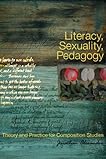 Literacy, Sexuality, Pedagogy: Theory and Practice for Composition Studies by Jonathan Alexander
Literacy, Sexuality, Pedagogy: Theory and Practice for Composition Studies by Jonathan Alexander
My review
rating: 5 of 5 stars
In Literacy, Sexuality, Pedagogy, Jonathan Alexander argues that literacy and sexuality are intricately linked and argues that composition should pay attention to a critical sexual literacy. He defines sexual literacy as “the knowledge complex that recognizes the significance of sexuality to self- and communal definition and that critically engages the stores we tell about sex and sexuality to probe them for controlling values and for ways to resist, when necessary, constraining norms” (5)—or more succinctly as “an intimate understanding of the ways in which sexuality is constructed in language and the ways in which our language and meaning-making systems are always already sexualized” (19). Taking feminism, critical pedagogy, and queer theory as his grounding, Alexander shows how students are developing sexual literacy in their literate lives outside of the classroom and shares his own and other teacher’s experiences of developing students’ sexual literacy in the classroom. While many may think that sexual literacy is necessary only for queer students, or for straight students to “tolerate” or “accept” queers, Alexander makes a compelling case that critical sexual literacy is necessary for all citizens—we all have sexualities and we are sexual citizens, he argues.
Since I’m already sympathetic to Alexander’s argument, I think he makes his case quite well. The examples from his classroom and others’ classrooms help to ground what he is discussing in material and situated practices. Alexander’s use of transgender and transexual theories and rhetorics to help the reader understand that gender (and thus sexuality) is always in transition (not that everyone is transgender, but that our genders are always changing) is an interesting insight. What I found most fascinating was his chapter on the rhetoric of marriage and how students created critical, intelligent arguments about marriage that moved beyond the gay/straight marriage debate and into realms of polyamory, historicizing marriage, and other issues about what constitutes a family.
Alexander closes with a chapter on resistance, and discusses how he has found little student resistance in discussing sexual literacy in his classroom. This is largely because students are interested in the topic, resulting in stronger writing from students as well. He thinks that the largest resistance will come from other faculty, who will, despite his argument, feel that sex/uality is too personal for the composition classroom. However, I agree with Alexander that he’s argued quite well that sex/uality and sexual literacy is a very public issue.
Great book overall. I think even if you’re uncomfortable with sex/uality, his chapter on marriage rhetoric is useful in considering how to “teach the conflicts” in Gerald Graff’s terms without relying on the same-old pro-con debates that students often fall into.

